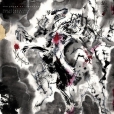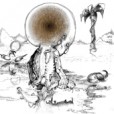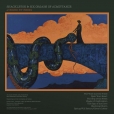Your basket is empty

Extra to the LP, with a magnificent, epic, head-scrambling remix, more spaced and spooked than the original. Shackleton’s dream liturgy fully unfolds — an eerie, garbled sublimity, a kind of black-magic plainsong.
Killer EP. Next-level Shackleton.
Taking off from Beaugars Seck’s foundational sabar drum rhythms — recorded by Sam in Dakar in February 2020 — Shackleton has constructed a trio of intricately layered, luminous, enchanted, epic excursions. The second is more dazzled and meandering, with jellied bass, insectile detail, and discombobulated jabbering; the third is more liquid, fleet of foot, and psychedelic, with a grooving b-line and funky keyboard stabs, scrambled eastern strings and hypnotic vocalese.
The harmonium in The Overwhelming Yes sounds like Nico blowing in chillily from up the desert shore.
The overall mood is wondrous, twinkling with light, onwards-and-upwards; an uncanny, dubwise mix of the ancient and the futuristic.
Mark Ernestus’ Version is stripped, trepidatious, mystical, and stranger still, with just a snatch of the original melody, extra distortion and delay, and crystal-clear drum sound.
So… Twenty minutes of startlingly original music, with Shackleton the maestro at the top of his game, and a characteristically evilous dub by Mark Ernestus. Mastered by Rashad Becker; handsomely sleeved.
Sick to the nth. Love 4 Ever.
The two dubstep pioneers at the top of their game. Truly an album, the music is multi-levelled — dark as anything at times, but engrossingly varied and emotionally shaded, always on the move.
Shackleton’s most expansive, ecstatic and hallucinatory music to date. Four extended excursions channeling Congotronics way to the east, with an aura of restrained mania reminiscent of the feral pomp and gallows humour of Coil’s moon-musick phase.
The pairing with Tomasini is a match made in heaven. Swooping from deep growl to piercing falsetto, his four-octave voice both heightens the taste for the theatrical that’s always been integral to Shackleton’s music, and makes explicit the latter’s kinship to the occult energies of the UK’s post-industrial underground.
As the title suggests, these are shadowy songs rich with allusions to bodily ritual and psychic exploration, with Tomasini’s lyrics framed by luminous whirls of hand-struck drums and synthetic gamelan, bells and tumbling organ melodies, all earthed by dubwise bass. You Are The One escalates from delicate choral chant to full-bore psychedelic organ freakout; Rinse Out All Contaminants is a slow incantation, to purge all negative thoughts; the melodies of Father You Have Left Me are smudged like early Steve Reich, then burned out by snarling subs; and the magnificent Twelve Shared Addictions balances elliptical melodies like spinning plates, gradually unfurling into a breakneck storm of voice and hammered keys.
No-one else makes music like this: devilishly complex but warm and intuitive, stirring together a dizzying assembly of outernational and outerspace influences, whilst retaining the subby funk-and-hot-breath pressure of Shackleton’s soundboy, club roots.
The result is an evolutionary, truly alchemical music — great shifting tides of dub, minimalist composition and choral song (Five Demiurgic Options); ritual spells to ward off the darkness (Before The Dam Broke, The Prophet Sequence); radiophonia and zoned-out guitar improv (Seven Virgins); even the febrile, freeform psychedelia of eighties noise rock (Sferic Ghost Transmits / Fear The Crown).
Over the five years since Music For The Quiet Hour, Vengeance’s vocal and lyrical range has rolled out across this new terrain. Throughout these six transmissions he’s hoarse preacher, sage scholar and ravaged bluesman; blind man marching off to war, and exhausted time-traveller warning of impending socio-ecological catastrophe.
Six dialogic accounts of our conflicted times, then, expanding beyond the treacly unease of the duo’s early collaborative work into something subtler and more emotionally shattering — its shades of brightness more dazzling, and its darkness even murkier.
“We almost didn’t hear it when the foundations went.”







